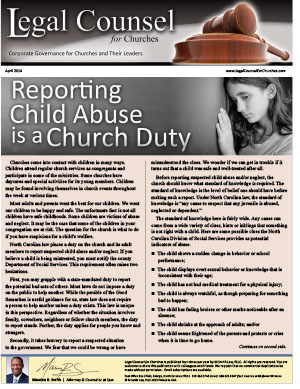Churches come into contact with children in many ways. Children attend regular church services as congregants and participate in some of the ministries. Some churches have daycares and special activities for its young members. Children may be found involving themselves in church events throughout the week at various times.
Most adults and parents want the best for our children. We want our children to be happy and safe. The unfortunate fact is not all children have safe childhoods. Some children are victims of abuse and neglect. It may be the case that some of the children in your congregation are at risk. The question for the church is what to do if you have suspicions for a child’s welfare.
North Carolina law places a duty on the church and its adult members to report suspected child abuse and/or neglect. If you believe a child is being mistreated, you must notify the county Department of Social Services. This requirement often raises two hesitations.
First, you may grapple with a state-mandated duty to report
the potential bad acts of others. Most laws do not impose a duty on the public to help another. While the parable of the Good Samaritan is useful guidance for us, state law does not require a person to help another unless a duty exists. This law is unique in this perspective. Regardless of whether the situation involves family, coworkers, neighbors or fellow church members, the duty to report stands. Further, the duty applies for people you know and strangers.
Secondly, it takes bravery to report a suspected situation to the government. We fear that we could be wrong or have misunderstood the clues. We wonder if we can get in trouble if it turns out that a child was safe and well-treated after all.
Before reporting suspected child abuse and/or neglect, the church should know what standard of knowledge is required. The standard of knowledge is the level of belief one should have before making such a report. Under North Carolina law, the standard of knowledge is “any cause to suspect that any juvenile is abused, neglected or dependent.”
The standard of knowledge here is fairly wide. Any cause can come from a wide variety of clues, hints or inklings that something is not right with a child. Here are some possible clues the North Carolina Division of Social Services provides as potential indicators of abuse.
- The child shows a sudden change in behavior or school performance;
- The child displays overt sexual behavior or knowledge that is inconsistent with their age;
- The child has not had medical treatment for a physical injury;
- The child is always watchful, as though preparing for something bad to happen;
- The child has fading bruises or other marks noticeable after an absence;
- The child shrinks at the approach of adults; and/or
- The child seems frightened of the parents and protests or cries when it is time to go home.
Caregivers and adults at church should be on the lookout for children that show signs of neglect. A neglected child is one who fits the following definition:
- Does not receive proper care, supervision, or discipline from his or her parent, guardian, custodian, or caretaker, or
- Has been abandoned, or
- Is not provided necessary medical or remedial care, or
- Lives in an environment injurious to the child’s welfare, or
- Has been placed for care or adoption in violation of the law.
A report of suspected child abuse and/or neglect can be made orally, by telephone or in writing. The report should include such information as the name and address of the child, name and address of the child’s parent, guardian or caretaker, the child’s age, other children in the home and the nature and extend of an injury resulting from the abuse.
If you or someone on behalf of the church has cause to believe a child has been abused or neglected, you are given immunity from liability under the law. North Carolina law provides immunity from liability for persons who make a report with good faith. However, the law does not provide explicit immunity for a failure to report suspected child abuse or neglect.
The question likely arises in your mind about the matter of privilege. Generally, the law affords the clergy the privilege of confidentiality for the conversations held with church members. This privilege means some church officials may not be compelled to report confidential matters. Privilege does not apply when it comes to the duty to report child abuse and neglect.
Under North Carolina law, clergy privilege is not grounds for failing to report that a juvenile may have been abused, neglected, or dependent, even if the knowledge or suspicion is acquired in an official professional capacity. If the church through its pastor, ministers, elders and other clergy recognizes the signs of abuse or neglect in a child, the duty to report is mandatory.
It is important for churches to consider how they will handle
a suspicion of child abuse or neglect. For this reason, the church
should consider extra training for its daycare, childen church
leaders, ushers, nursing staff and any other persons who come
into contact with children. The staff should be clear on how to
identify a child under these risk factors. The staff should be given
guidance on how the church wants to report and record such
incidents.
Protecting children from the harms of abuse and neglect is a duty that attaches to every member of society. The church has an important role in helping safeguard our youngest neighbors. Your church can make a big difference in a child’s life.

